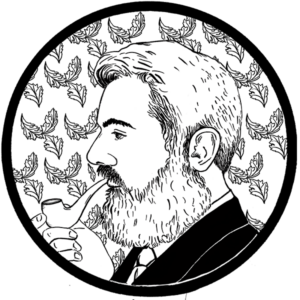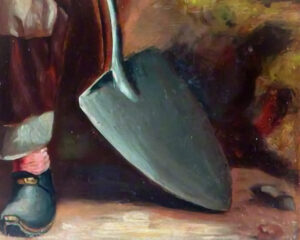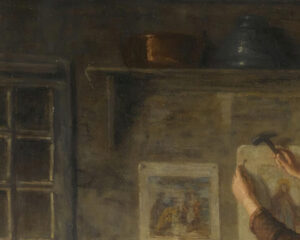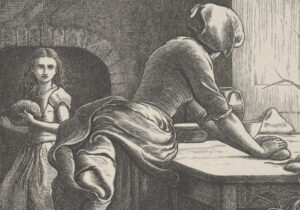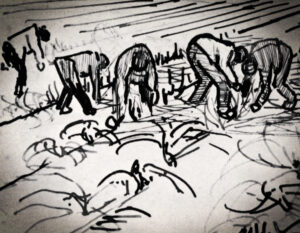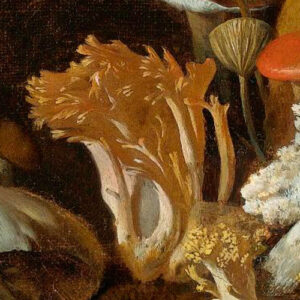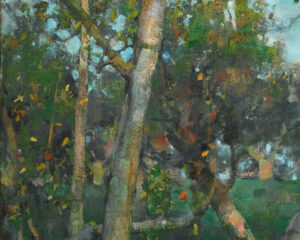Want of Wonder
Seven Suggestions for
Becoming More Childlike

Mr. Michael Warren Davis
“The world will never starve for want of wonders; only for want of wonder.”
—G. K. Chesterton
One day, I was sitting at our kitchen table watching a compilation of ads from the early 2000s. Like all Millennials, I’m a slave to nostalgia. One of them hit a little too hard, though: the commercial for York’s Wild Kingdom.
For those who didn’t grow up in northern New England, York’s Wild Kingdom is a zoo-cum-theme park in downtown York, Maine. As either a zoo or a theme park, the Wild Kingdom probably wouldn’t pass muster. But the fact that it’s both things at once makes it magical. Being able to ride a Ferris wheel and an elephant on the same day is deeply significant. Needless to say.
My grandparents lived in York, so the music from the Wild Kingdom commercial is like a time machine. As soon as I hear it, I’m eight years old again — riding the old trolly, or playing ski-ball, or watching the taffy-pullers at Goldenrod’s, or eating fish and chips at the Union Bluff, or sitting by the campfire with my grandfather, making s’mores and listening to the waves break on the bluff.
I remember that a wooden fence ran halfway round the cliff’s edge, fencing in my grandmother’s garden. She had a green thumb, but her favorite flowers were the wild sea roses that grew over the fence. Every year they came back thick as a hedge, a living wall between us and the Atlantic.
As I have often told people, my childhood was idyllic.
I grew up in an old farmhouse about an hour north of Boston. There were ten acres of woods in our backyard that used to belong to John Greenleaf Whittier. Now they belong to the Historical Society, which means (for all practical purposes) they belonged to me. Unless Wally the Farmer was mowing the big field for hay, I had the place all to myself. I spent hours back there walking the dog with my mom, climbing trees with my dad, building forts with my friends, or reading in the sun.
Unless Wally the Farmer was mowing the big field for hay, I had the place all to myself. I spent hours back there walking the dog with my mom, climbing trees with my dad, building forts with my friends, or reading in the sun.
All of these happy memories came flooding back as I listened to this curious old commercial — memories of a time of wonder and awe. But by the end of the commercial, more than anything else, I felt shame.
The Davises live in a small apartment on a busy road. In the summer, we can’t sleep with the windows open for all the pickup trucks and motorcycles. The back yard was entirely paved over to make a parking lot.
When my wife and I got married in 2019, we expected to put a down payment on a house in a year or two. Then COVID happened, and the economy took a nosedive. Now it seems like we have two options: leave New England (including all our family and friends) or rent until we’re in our forties.
I was brokenhearted — not for myself, but for my daughters. I hate that I can’t give them what I had. All people, but especially children, have an inalienable right to Nature. Tycoons and communists shouldn’t be allowed to buy up hundreds of square miles of farmland while young families can’t afford one-eighth of an acre for a house and tire swing. My daughters deserve at least that much.
All these thoughts are surging around my head as I sit at the kitchen table.
Then I look out the window.
Next door there’s a huge, abandoned house. The backyard is completely overgrown. No one’s lived there for two years except a family of possums. There’s a chain link fence between the two lots, which is overgrown with vines. And there I see, among the vines, a single sea rose in bloom.
 If there had always been sea roses growing on that fence, I’d never noticed. But seeing that flower at just that moment drew me even deeper into my reverie — only this time, it wasn’t like a time machine at all. I don’t know how to describe it except to say that, for a split second, I was a kid again. The sun seemed to shine brighter. The colors seemed more vivid. My habit of scanning and skimming, developed over years as an editor, went away. Everything held a new fascination for me. My eyes wanted to linger on every luscious detail. Everything seemed more enticing, more defined, more real.
If there had always been sea roses growing on that fence, I’d never noticed. But seeing that flower at just that moment drew me even deeper into my reverie — only this time, it wasn’t like a time machine at all. I don’t know how to describe it except to say that, for a split second, I was a kid again. The sun seemed to shine brighter. The colors seemed more vivid. My habit of scanning and skimming, developed over years as an editor, went away. Everything held a new fascination for me. My eyes wanted to linger on every luscious detail. Everything seemed more enticing, more defined, more real.
This feeling didn’t last for more than a second or two. Yet I remember sensing a certain duty — both thrilling and deeply solemn — to explore every nook and cranny of . . . well, everywhere. I felt like I had to. What’s more, I felt like I could. I seemed to belong out there, in the world. And the world belonged to me.
At that moment I realized two things, which are really the same thing.
First, my daughters are going to delight in the world around them as long as I don’t get in their way. Our three-year-old, Beatrice, loves nothing more than to splash in the puddles in our dismal parking lot. I mean that literally, too. I could tell her we’re going to have Birthday Soup with Little Bear, but if it’s raining outside, she’ll sob hysterically as I buckle her into her car seat.
Second, I wouldn’t be so down on our apartment — or our yard, or our neighborhood, or the world — if I could look at the world the way Bea does.
And I really don’t think that’s as hard as it sounds. What that reverie made me realize is that we see the exact same world as our children. In fact, we see the exact same world we saw as children. The difference isn’t “out there.” It’s in here: in my self. We allow ourselves to become bored and cynical. We take the world for granted.
* * *
Some months after the commercial in the kitchen, I found myself having beers with a friend of mine, a single man. We’ll call him Jeff. He said to me, “When you’re a kid, your job is to suck as much nectar out of life as possible. Then when you’re an adult, and you have a child, that part of your life is over. Now your job is to protect her while she sucks as much nectar out of life as possible.”
I told Jeff then what I’ll tell you now: that’s dead wrong. Popular culture feeds us this idea that marriage is the “ball and chain,” and that children are a nuisance. But that’s a lie. Yes: as a parent, you have to protect your kids. Of course. But didn’t the Master say, “Except ye be converted, and become as little children, ye shall not enter into the kingdom of heaven”?
I know this subject makes some Christians break out in hives. As with all the Lord’s teachings, our instinct is to explain it away — to “refine” and “clarify” our terms until we’re left with nothing but a truism. When this particular passage comes up, folks like to say, “We’re supposed to be childlike, but not childish.”
 Now, if you’ve ever thought that Jesus is telling us to wear sparkly Velcro shoes or eat random things we find on the floor like a toddler, let me disabuse you of that notion. Really, though: anyone who’s ever met a child knows exactly what Jesus means. He wants us to be kind and friendly, as children are. He wants us to be open and trusting, as children are. He wants us to be innocent, as children are. And he wants us to be wonderful — literally, full of wonder — as children are.
Now, if you’ve ever thought that Jesus is telling us to wear sparkly Velcro shoes or eat random things we find on the floor like a toddler, let me disabuse you of that notion. Really, though: anyone who’s ever met a child knows exactly what Jesus means. He wants us to be kind and friendly, as children are. He wants us to be open and trusting, as children are. He wants us to be innocent, as children are. And he wants us to be wonderful — literally, full of wonder — as children are.
As always, Chesterton put it best. “When we are very young children,” he said, “we do not need fairy tales. We only need tales. Mere life is interesting enough. A child of seven is excited by being told that Tommy opened a door and saw a dragon. But a child of three is excited by being told that Tommy opened a door.”
In fact, God Himself is childlike:
Because children have abounding vitality, because they are in spirit fierce and free, therefore they want things repeated and unchanged. They always say, “Do it again”; and the grown-up person does it again until he is nearly dead. For grown-up people are not strong enough to exult in monotony. But perhaps God is strong enough to exult in monotony. It is possible that God says every morning, “Do it again” to the sun; and every evening, “Do it again” to the moon. It may not be automatic necessity that makes all daisies alike; it may be that God makes every daisy separately, but has never got tired of making them. It may be that He has the eternal appetite of infancy; for we have sinned and grown old, and our Father is younger than we.
To put it another way, children live in a state of constant receptivity. They’re completely open to new people, places, things, and experiences—just as they are to old people, places, and experiences. This is what makes them so vulnerable. It’s why, as we grow older, we have to learn discernment. But after becoming worldlywise in our teens, we need to relearn our natural receptivity as adults. And what better teachers than our own children?
* * *
I remember the first time my wife was pregnant, back when she was in grad school. As we sat on the couch, dreaming about our new child, I realized that I’d never read any of the great works of children’s literature: Frog and Toad, Winnie-the-Pooh, the Chronicles of Narnia, the Lord of the Rings . . . I had a lot of catching up to do. So, I decided to work my way backwards, beginning with Tolkien.
From the very first page of The Fellowship, I was hooked. For weeks, I could do nothing but read. I remember my wife threw a party for her classmates at grad school. I liked them all, but I didn’t have time to socialize. I spent the night upstairs in our bedroom, curled up in a rocking chair, finishing the last chapter of The Return of the King and sobbing like . . . well, like a child.
Slowly, it dawned on me: I was imagining things. I could actually see the characters, the landscapes. I could hear the hobbits singing, the steel clashing, the wind whipping over the mountains. I could smell Shelob’s den and taste the Ent-draughts. Tolkien helped me find my imagination, and my unborn child helped me to find Tolkien.
The imaginative arts are their own reward. But I had a second realization. Reading those books was one of the most joy-filled experiences of my life — and it was completely wholesome. From the time I was in middle school (at least!), I’d looked for happiness in alcohol and all the other worst places . . . but here I was, skipping a cocktail party in my own house so I could read a book about elves and dragons.
That’s when I realized, the enemy of childlikeness is fear. We know children are happier than we are, with their endless innocent pleasures. So, why don’t we become more like them? Why don’t we even try?
Because we’re afraid to be open, to be kind. We’re afraid of being rejected.
We’re afraid of being judged. Rod Dreher has written movingly about a friend of his who converted to chastity — and, eventually, to Christianity— after seeing the love inherent in the ordinary family life of a friend. “All my life I’ve been waiting for somebody to give me permission to be wholesome,” she told Rod. In our culture, innocence is a vice. That’s why Target sells bikinis for toddlers. We don’t even want children to be childlike. (That alone should prove that Satan is the lord of this world.) But for a grown-up to pursue wholesomeness is embarrassing, even shameful.
And if we’re being honest, I think most of us strongly suspect that vice is more fun than virtue. “Being good” is something we do to avoid punishment in the afterlife; all things being equal, we would prefer to sin. In other words, we don’t believe that anyone could delight in God’s statutes (Psalm 118:16). We’re afraid we won’t be happy. In other words, we don’t trust our Father.
As George MacDonald put it, “That man is perfect in faith who can come to God in the utter dearth of his feelings and his desires, without a glow or an aspiration, with the weight of low thoughts, failures, neglects, and wandering forgetfulness, and say to Him, ‘You are my refuge, because you are my home.'”
As George MacDonald put it, "That man is perfect in faith who can come to God in the utter dearth of his feelings and his desires, without a glow or an aspiration, with the weight of low thoughts, failures, neglects, and wandering forgetfulness, and say to him, 'You are my refuge, because you are my home.'"
This, then, is the first step to becoming childlike: we must recognize that we are literally children. We have to dwell in our childhood. We have to entrust ourselves, as children, to the Father’s love. His Fatherhood must be our creed; his love must be our worldview. And our childhood must be the very basis of our self-identity.
And so there, finally, you have it! — my first suggestion for growing more childlike. Wrestle with this truth until it sinks deep inside you: you are, in fact, a child.
That one step will take you a long way, maybe all the way. It’s the main thing I’ve learned from all this. But as the title did promise seven suggestions, here follow six more. I practice these things imperfectly at best, but they’re pragmatic and achievable, and I think they’ve helped me, and I think they’re worth passing on:
2. Spend less time on your screen and more time with your prayer rope, rosary, et al. Meditative prayer is good-in-itself, of course. But it also helps to strengthen our powers of concentration, making us better able to resist the little palantíri in our pockets and experience awe at the real world — just as we did (or ought to have done) when we were kids. Also, as a rule, only use screens for work, and only during work hours. Certainly, you shouldn’t use your phone or television after 8 p.m.
3. Don’t read the books you think you should read. Read the books you want to read. (And if you don’t know what books you want to read, I respectfully propose that you want to read the following: The Blue Fairy Book by Andrew Lang, Robin Hood by Henry Gilbert, The Wind in the Willows by Kenenth Grahame, The Princess and the Goblin by George MacDonald, The Hobbit by J. R. R. Tolkien, The Adventures of Sherlock Holmes by Sir Arthur Conan Doyle, Around the World in Eighty Days by Jules Verne, Father Brown by G. K. Chesterton, King Solomon’s Mines by H. Rider Haggard, Lost Horizon by James Hilton, or Leave It to Psmith by P. G. Wodehouse.)
And if you can, buy them in attractive hardcovers. Very intelligent people people claim they’re just as happy with a tattered old paperback as with something hardcover and leather-bound. In fact, they prefer it! There’s less distraction. It helps them focus on the words. Look: that’s all hogwash. As the Medievals knew, we honor a text by making it beautiful. Also, it’s more fun. Reading should be a feast for the senses as well as the intellect.
4. Make up stories and tell them to your children. Don’t worry about being derivative or copying. As Eliot said, “Immature poets imitate; mature poets steal.” Malory wasn’t the first person to tell the story of King Arthur, nor was he the last. And that’s okay. The story is the point, not the teller.
If you don’t have children, write your stories down. Even if you do have children, write them down anyway. If you can, use fountain pens and beautiful notebooks that you tie up with string. Writing, like reading, should be a sensual experience.
5. Have tea parties. Yes, tea parties. Use nice cups and saucers. Serve cakes, sandwiches, and cheese. It’s fancy. And it is fun (and important) to be fancy sometimes.
6. Play dress up. Kids love to do so around the house, if you’ll let them — but you have the opportunity do so anytime you want, and in real life. So this means coats and ties . . . skirts and cardigans . . . that sort of thing. Modest, yes, but also (like tea parties) somewhat fancy. You’ll feel good about yourself, and other people will enjoy looking at you. You’ll be happier, and you’ll make other people happy.
7. Go outside for at least an hour every day. Human beings need nature in order to thrive physically, mentally, and spiritually. That’s why children are happy to spend literally all day playing on a tiny patch of brown grass. They haven’t learned to suppress these instincts. Nature is also genuinely interesting. Just make one small effort to really notice something—a bird, a stream, a tree, an anthill, a cloud—and you’ll be hypnotized.
Meanwhile, when you’re outside, say hello to a stranger — at least one every day. Strike up a full conversation with a stranger once a week. Kids will naturally talk to anyone, until we convince them that this is dangerous. (If you don’t encounter strangers on a daily basis . . . well, now that’s dangerous — in that case you need a change of lifestyle anyway.)
* * *
The older I get, the more convinced I become that this is the key to our happiness — both in this life and the next. Just as marriage isn’t the end of romance but the beginning, so too adulthood isn’t the end of childhood. Believe this as surely as you believe in the Father’s love, and all will be well.


